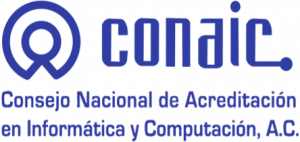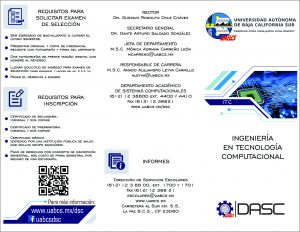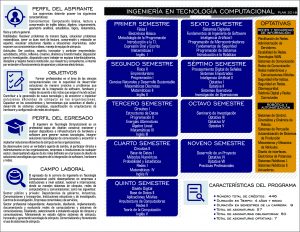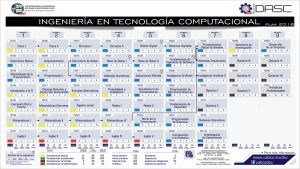Computer Technology Engineering
- Total number of credits: 446
- Duration in Time: 4 and a half years
- Duration in semesters of the course: 9
- Total number of subjects: 57
- Total number of required courses: 50
- Total elective subjects: 7
- Total credits basic competencies: 128
- Total credits professional competencies: 208
- Total credits for terminal competencies: 52
- Total credits complementary competencies: 30
- Educational Model: Based on competencies.
- Social Service: 480 hrs and six months minimum (70% of credits covered)
- Professional internships: 160 hours dedicated to activities related to their discipline (ninth semester).
- Compulsory extracurricular activity: Sports or Culture (for 1 semester)
Training-related objectives professional
- To train professionals in the area of computer science with the ability to develop creative solutions to problems that require the integration of software, hardware and networks according to the challenges of today's world.
- Contribute to the generation of new technology and to find and implement efficient computing solutions in organizations.
- To train in the knowledge and tools that support the design and development of complex systems, specification of hardware architectures and configuration of computer networks.
Mision:
To train competent professionals with the knowledge, abilities, attitudes, skills and values that allow them to creatively solve problems that require the integration of software, hardware and networks, in order to implement computer technology for the proper functioning of their processes, encouraging them to develop their capacity for innovation and research to solve the needs and problems of their environment for national progress.
Vision:
Consolidate the Computer Technology Engineering as the educational program that provides the leading human resource in the development of cutting-edge information and communication technologies. With the maximum commitment to educational quality of excellence, for the integral and professional development of our students.
In addition to the entrance requirements indicated in the University Legislation on the General Enrollment Regulations, applicants to enter the Computer Technology Engineering program must possess the following characteristics:
Knowledge:
Basic computing, reading and understanding of basic English, algebra, trigonometry, analytical geometry, statistics, logic, mathematics, physics and general culture.
Skills:
Solve problems logically, solve mathematical problems, have a good level of reading, comprehension and writing in Spanish, visualize quick solutions to unforeseen situations, know how to expose their knowledge and ideas, handling computer equipment.
Attitudes:
To be positive, innovative spirit and entrepreneurial character, self-taught, critical, reflective, creative, dynamic and transforming, willingness for research, willingness to work in interdisciplinary teams, discipline and respect towards the institution, their teachers and peers, and interest in understanding the operation of electronic devices and systems.
The Computer Technology Engineer is a professional capable of: designing, building, maintaining and evaluating hardware and software devices and infrastructure to generate new technologies, integrating technological communication solutions and finding and implementing efficient computing solutions in organizations.
He develops as a true agent of change, by participating directly and indirectly in organizations, companies or institutions of any sector, playing any of the roles defined in the design process of technological solutions that require the integration of software, hardware and networks.
It also has the necessary training to adapt to new technological paradigms and continue with postgraduate studies or specialization in some of the many areas of Information Technology.
The competencies that allow him to achieve the described profile are:
- Distingue los aspectos fundamentales de un problema para diseñar soluciones tecnológicas y prácticas.
- Uses methodologies for the development of complete computational solutions including multidisciplinary problems.
- Uses methodologies and techniques for the development of control systems for the automation of processes that require complex computational systems.
- Confronts technological changes, adapting techniques and systems.
- Apply and responsibly adapt new technologies of computer systems, networks and communications, according to the needs of organizations, encouraging sustainable development.
- Manages and optimizes time and cost of the resources involved in the development of a network and communications project.
- Understands the social, political, ecological and ethical factors related to technological development and professional performance.
- Uses tools to determine customer needs and translate them into a project that requires the integration of software, hardware and networks to be applied to the organization.
- Apply standards, models and techniques that provide a basis for the design of networks and communications in the organization.
- Applies standards, models and techniques that provide a basis for the design of networks and communications in the organization.
Graduates of the Computer Technology Engineering program will be able to work in companies and institutions at the state, national and international level, where computer systems, computer networks and communications are handled, such as the following:
Public and private sector:
- Government agencies.
- Industries
- Communications and transportation.
- Educational and research institutions.
- Research centers.
- Commercial and service companies.
As an independent professional:
- Consulting, designing, implementing, documenting and evaluating computer networks and communications systems.
- Designing, selecting and installing computer and communications equipment.
- Maintaining computer systems in optimal condition.
- Innovating and generating computer technology.
- Marketing and promoting the use of computer systems.
Subjects:
Electives Package
Network and Information Security Area
| Key Elective | Unit of Competence |
|---|---|
| OPT-01 | Network Planning |
| OPT-02 | Server Management |
| OPT-03 | Network Scalability |
| OPT-04 | WAN Technologies |
| OPT-05 | Communication Systems |
| OPT-06 | Wireless Networks and Mobile Communications |
| OPT-07 | Computer Security |
| OPT-08 | Network Security |
| OPT-09 | Cybersecurity |
| OPT-10 | Digital Telephony and Switched Networks |
Robotics and Automation Area
| Key Elective | Unit of Competence |
|---|---|
| OPT-11 | Control Systems |
| OPT-12 | Robot Kinematics and Dynamics |
| OPT-13 | Percussion Systems |
| OPT-14 | Automation of Production Systems |
| OPT-15 | Mecanismos y Mecánica de Vehículos |
| OPT-16 | Interface Design |
| OPT-17 | Power Electronics |
| OPT-18 | Robotic Systems I |
| OPT-19 | Robotic Systems I |
| OPT-20 | Actuators |
Área de Inteligencia Artificial
| Key Elective | Unit of Competence |
|---|---|
| OPT-21 | Redes Neuronales |
| OPT-22 | Visión Artificial |
| OPT-23 | Reconocimiento de Patrones |
| OPT-24 | Agrupamiento de Datos |
| OPT-25 | Algoritmos de Aprendizaje |
| OPT-26 | Deep Learning |
| OPT-27 | Introducción a la Ciencia de Datos |
| OPT-28 | Algoritmos de Optimización |
| OPT-29 | Natural Language Processing |
| OPT-30 | Control Inteligente |
Área de Internet de las Cosas (IoT)
| Key Elective | Unit of Competence |
|---|---|
| OPT-31 | Big Data y Ciencia de Datos |
| OPT-32 | Servicios y plataformas en la nube |
| OPT-33 | Seguridad de los Datos |
| OPT-34 | Bases de Datos No Relacionales |
| OPT-35 | Protocolos de Comunicación |
| OPT-36 | Sensores |
| OPT-37 | Redes Alámbricas e Inalámbricas |
| OPT-38 | Domótica |
| OPT-39 | Microcontroladores |
| OPT-40 | Protocolos para IoT |
| OPT-41 | Sensores en IoT |




